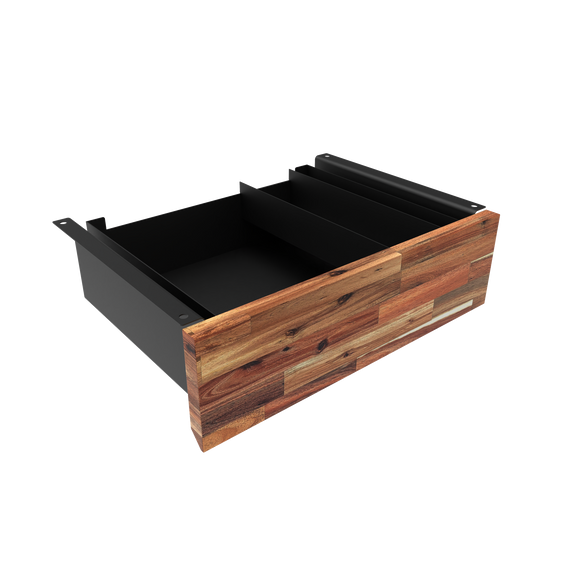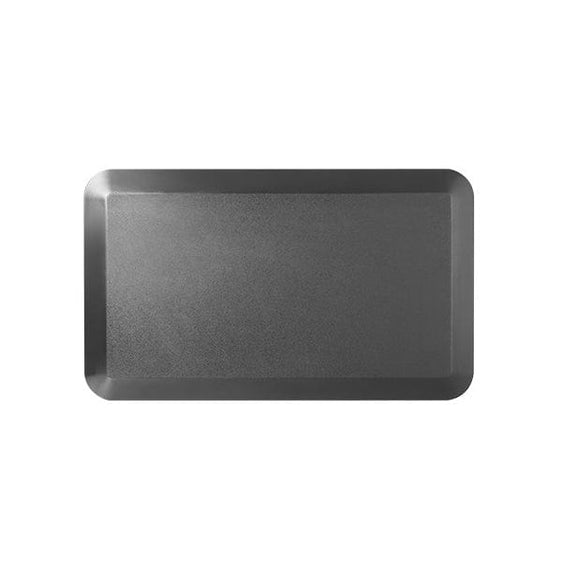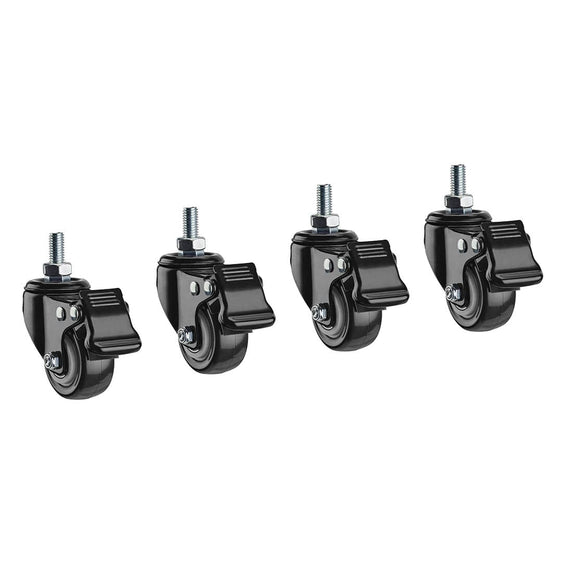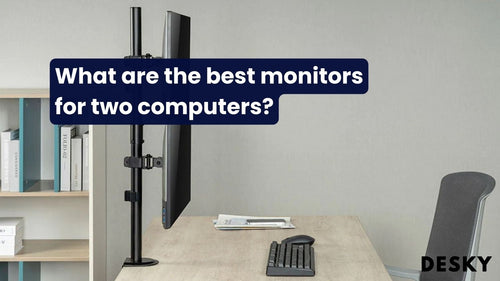
FAQ
What is the best screen set up for home office?
Hayden AdamsWelcome to our detailed exploration of setting up your home office screen. We understand the challenge of creating an effective, ergonomically friendly environment. With the help of our research and the experts at Desky, we aim to guide you on this journey.
Optimal Screen Setting for Office Work
When it comes to screen settings, the scenario is important. A standout choice that functions admirably is the Dark Mode, particularly when you're laboring under dim light or at night.
Dark mode is highly effective in reducing eyestrain. Nevertheless, if the room has abundance of light, you're encouraged to use a white background to minimize additional strain on your eyes. To further optimize your screen setup, consider adding a monitor light bar.
Enhancing Screen Comfort with Monitor Light Bars
Monitor light bars bring a plethora of benefits to the table. They effectively brighten up your workspace without casting unwanted shadows or adding excessive screen glare.
Regular usage can even mitigate concerning health issues like eye fatigue and headaches commonly associated with extensive screen time.
How to choose a light bar
Making the right choice involves a couple of crucial considerations. These include size, brightness, color temperature, and the light bar's features, such as adjustability and installation options.
What wattage light bar should I get?
When it comes to wattage, it's essential to strike a balance. Most commonly, a 22-inch light bar comes equipped with 120 watts of power, but many users find a 240-watt light bar more sufficient for their needs.
It’s always recommended to assess your personal and professional usage before settling for a wattage. However, high-wattage light bars exceeding 800 watts are also available for users seeking powerful lighting solutions.
How to determine the right wattage
- Measure your workspace: Larger spaces may require more illumination, hence higher wattage.
- Consider the tasks you perform: High-detail tasks such as reading, drawing, or design work may need brighter light and, thus, a higher wattage bar.
How many lumen is a good light bar?
Knowing the lumen output of a light bar is equally important. It directly relates to the light’s brightness. A good LED light bar will offer lumen outputs ranging between 6500 and 24000 lumens.
The higher the lumen count, the brighter the light. However, remember that overly bright lights can also lead to discomfort, so choose wisely. It's advisable to opt for light bars with adjustable brightness for a significantly more comfortable working experience.
{{ spec_dual_monitor_arm }}
Home Office Monitor Specifications
A crucial aspect to consider when choosing a monitor for your home office is the screen resolution. While 1080p will get the job done, the preferred choice lies with 4K resolution. Offering the clearest image quality, it also aids in the legibility of smaller fonts.
However, bear in mind that most 4K monitors rest on the pricier side of the scale. Speaking of dimensions, a 27-inch 4K monitor boasts 163 pixels per inch, presenting a compelling argument for sharp image quality.
The Ultimate Screen Quality
Talking about screen quality, Ultra HD, fondly known as 4K (3840x2160), stands at the top of the line. Offering four-fold resolution in Full HD, it's a hot favorite in the premium category of monitors and TVs.
Then there's the game-changing 8K (7680x4320), which quadruples 4K, marking the zenith of current monitor technology.
Why are 4k and 8k important?
These advanced resolutions primarily benefit:
- Enhanced picture detail and depth
- Increased on-screen desktop space
- Greater realism in games and high-definition video
Top Monitor Brand with Superior Display Quality
Samsung is surfing ahead in the globe's small and medium-sized display market. Samsung's OLED screens take the crown, boasting unmatched image clarity, sleek design and efficient power consumption. For innovative technologies that redefine visual perception, this tech behemoth has set the bar considerably high.
Best Monitor Brand Amicable To Eyes
As far as protection against harmful effects such as eye strain and fatigue is concerned, specific brands focus on user’s eye health.
Without naming one single brand, we’d specify that monitor brands offering inbuilt eye-care technologies such as Flicker-Free technology and Low Blue Light technology tend to be more favorable for your eyes.
Eye-care technologies:
- Flicker-Free technology: Helps reduce screen flickering, a major cause of eye strain.
- Low Blue Light technology: Minimizes potentially harmful blue light emissions.
Ideal Screen Size for Home Office
Striking the right balance between screen size and cost can be critical for many. In such cases, a 27-inch monitor delivers on both fronts. For those involved in heavy multitasking or gaming, an ultra-wide monitor can be an excellent substitute for a dual-screen setup.
Alternatively, you might consider optimizing your workspace configuration with multiple smaller monitors, such as two 24-inch screens. This allows you to have different applications or documents open simultaneously without the need to constantly switch between them.
Which computer screen should you invest in?
Choosing the best computer screen depends on an array of factors, including intended use, personal needs, and budget.
Factors to consider include the type of screen technology, size, resolution, and the ergonomics of the design.
Monitor Placement for Optimal Work Efficiency
Your primary work monitor should always face you directly, akin to a single-monitor setup. Conveniently situate your secondary monitor to one side, arranged at a semi-circular or half-circle angle. Not only will this leverage efficiency, but it will also emerge as a long-lasting solution to avoid unnecessary physical strain.
Moreover, you can enhance your work performance and well-being by using an adjustable standing desk from Desky, which allows you to switch between sitting and standing with ease and comfort. Desky offers a range of high-quality, stable, and easy-to-operate standing desks that suit your needs and preferences.
Adjustment Tips for Optimal Monitor Placement:
- Align the monitor's top with, or slightly below, eye level.
- Position the secondary monitor at a comfortable viewing angle.
- Ensure there is enough distance between you and the monitors to avoid eye strain.
Enhancing Workspace Privacy: How to Hide Your Computer Screen

While optimizing your monitor placement is essential for work efficiency and physical comfort, maintaining privacy can also be a concern in open office environments or shared spaces. Below, we'll talk about how to best hide your screen at home or at work.
How to make computer screen invisible to others
Maintaining the privacy of your screen requires a combination of physical arrangements and technology. First, position your monitor in such a way that it's less visible to passersby.
Next, invest in a privacy screen. These filters minimize viewing angles, ensuring the screen content is visible only to the person in front of the screen. Some advanced models protect your eyes from harmful blue light emissions, too.
How to stop people from seeing my screen
Beyond physical adjustments and privacy screens, technological solutions can offer further protection. Take advantage of software like Hide Window Hotkey that allows you to quickly hide active windows.
Furthermore, consider using privacy-friendly web browsers or add-ons, like Tor or HTTPS Everywhere, which provide end-to-end encryption to protect your data.
How to quickly hide computer screen
Need to immediately hide your screen? Many operating systems offer hotkeys to quickly minimize or close your active windows.
For example, if you use Windows, pressing Windows key + D will bring you right to the desktop. Alternatively, customizing your own set of hotkeys can provide a speedy solution tailored to your needs.
Mac Keyboard Shortcuts:
- Command + H: Hides active application. Other apps remain visible.
- Command + Option + H: Hides other applications' windows. Only the active application will be visible.
Windows Keyboard Shortcuts:
- Windows Key + M: Minimize all windows.
- Windows Key + D: Show or hide the desktop.
How to hide desktop computer
If you're looking to camouflage the physical computer itself, there are several ways to do this.
Concealing the computer within your room’s décor or placing it behind something larger, like your monitor, may help. Even enclosing it within a cabinet or desk drawer in a compact space can offer a level of visual discretion.
Final Thoughts
To sum up, setting up a home office screen involves considering various factors like screen setting, monitor resolution, size, and layout. Dark Mode or a white background should be chosen based on the room’s lighting.
Investing in a 27-inch 4K monitor adds to the overall quality of the setup, while the layout involves placing the primary monitor directly in front of you with the secondary one to the side. Don't forget the convenience of adjustable features, like those provided by Desky which allow you to customize the height and angle of your monitors to reduce strain on your neck and eyes.
Here's wishing you a comfortable and productive home office setup!








